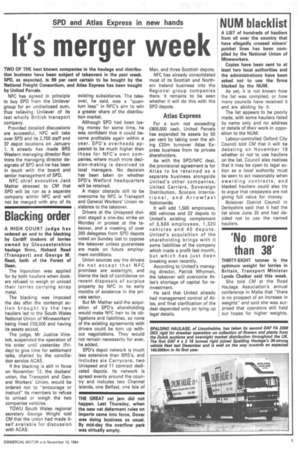It's merger week
Page 5

If you've noticed an error in this article please click here to report it so we can fix it.
TWO OF THE best known companies in the haulage and distribution business have been subject of takeovers in the past week.
SPD, as expected, is 99 per cent certain to be bought by the National Freight Consortium, and Atlas Express has been bought by United Parcels.
NFC has agreed in principle to buy SPD from the Unilever group for an undisclosed sum, thus relieving Unilever of its last wholly British transport company.
Provided detailed discussions are successful, NFC will take over SPD and its 2,700 staff and 37 depot locations on January 1. It already has made BRS Western managing director Ron Irons the managing director designate of SPD and he has been in touch with the board and senior management of SPD.
NFC chief executive Jack Mather stressed to CM that SPD will be run as a separate company within NFC and will not be merged with any of its existing subsidiaries. The takeover, he said, was a "quantum leap" in NFC's aim to win a greater share of the distribution market.
Although SPD had been losing money for some time, he was confident that it could become profitable again within a year. SPD's overheads appeared to be much higher than those for NFC's own companies, where much more decision-making is devolved to local managers. No decision has been taken on whether SPD's Watford headquarters will be retained.
A major obstacle still to be overcome by NFC is Transport and General Workers' Union resistance to the takeover.
Drivers at the Unispeed division staged a one-day strike on Monday in protest at the takeover, and a meeting of over 200 delegates from SPD depots voted on Sunday last to oppose the takeover unless guarantees are made on future employment conditions.
Union sources say the drivers do not accept that NFC promises are watertight, and blame the lack of confidence on recent disposals of surplus property by NFC in its early months of existence in the private sector.
But Mr Mather said the acquisition of SPD's shareholding would make NFC heir to its obligations and liabilities, so none of the existing agreements with drivers could be torn up without negotiations. They would not remain necessarily for ever, he added.
SPD's depot network is much less extensive than BRS's, and includes six Carrycare, two Unispeed and 11 contract dedicated depots. Its network is spread evenly around the country and includes two Channel Islands, one Belfast, one Isle of Man, and three Scottish depots.
NFC has already consolidated most of its Scottish and Northern Ireland business into the Regional group companies there. It remains to be seen whether it will do this with the SPD depots.
Atlas Express
For a sum not exceeding £800,000 cash, United Parcels has expanded its assets by 50 per cent by taking over the ailing £20m turnover Atlas Express business from its private shareholders.
As with the SPD/NFC deal, the provisional agreement is for Atlas to be retained as a separate business alongside United's other companies, United Carriers, Sovereign Distribution, Scorpio International, and Arrowfast Nationwide.
It will add 1,500 employees, 600 vehicles and 22 depots to United's existing complement of 3,500 employees, 1,320 vehicles and 40 depots. United's acquisition of the shareholding brings with it some liabilities of the company which made a profit last month, but which has just been breaking even recently.
According to United's managing director, Patrick Whyman, the takeover will overcome Atlas's shortage of capital for reinvestment.
He said that United already had management control of Atlas, and final clarification of the deal depended only on tying up legal details.




































































































